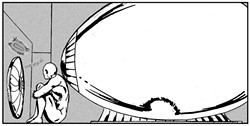Upgrade strikes back
Louis Rosenberg, mechanical engineering professor turned sci-fi author, returns with the final installments of his graphic novel
By Anna Weltner[{
"name": "Newsletter Promo",
"id": "NewsletterPromo",
"class": "inlineCenter",
"insertPoint": "4",
"component": "15264767",
"requiredCountToDisplay": "0"
},{
"name": "Ad - Medium Rectangle CC01 - 300x250",
"id": "AdMediumRectangleCC01300x250",
"class": "inlineCenter",
"insertPoint": "8",
"component": "2963441",
"requiredCountToDisplay": "12"
},{
"name": "Ad - Medium Rectangle LC01 - 300x250",
"id": "AdMediumRectangleCC01300x250",
"class": "inlineCenter",
"insertPoint": "18",
"component": "2963441",
"requiredCountToDisplay": "22"
},{
"name": "Ad - Medium Rectangle LC09 - 300x250",
"id": "AdMediumRectangleLC09300x250",
"class": "inlineCenter",
"insertPoint": "28",
"component": "3252660",
"requiredCountToDisplay": "32"
}]
Last summer, Louis Rosenberg released the first installment of Upgrade, a delightfully dystopian graphic novel adapted from his screenplay of the same name. Rosenburg, a former Cal Poly professor of mechanical engineering and education technology gone rogue, introduced us to the world of Avery J. Mankin, algorithms analyst, in the year 2058.
Last month, he released the final installment in the series, which is now available in paperback. In the future, the prologue explains, everything happens online. (The outside world was rarely depicted in the first installment, and was generally regarded as a terrifying, dangerous, dirty place.) The government as we know it has been replaced by an entity called United Systems, and its “members,” as they are called, simply wake up, pull on suits that look like gray onesies, and hop into their access modules, downloading their clothes, maybe installing a nice tan, and going about their bright, efficient online existences. Meanwhile, their real bodies—and lives—waste away in isolation.
Life is bright and convenient, but trouble soon comes calling for “exemplary” member Mankin. (“Exemplary!” is an interjection everyone uses instead of “great!” as if to instill the idea that everyone could be great if he or she simply followed a predetermined pattern, an example—in turn becoming an example oneself.) When an abnormally large rat breaks into his apartment in the night, smashing his system clock, things get off to a rough start. Not only does Mankin oversleep, missing the median arrival time by (gasp!) 69 minutes, he’s also charged with such crimes as “undermining system infrastructure” and “destruction of system property.” Soon, the all-seeing system is digging up all sorts of incriminating, out-of-context dirt on Mankin to add to the list.
Suddenly facing overwhelming evidence as to his deviant nature, our hero is banned from the system for an entire year. The final panel of the first installment shows a shivering, frail Mankin huddling miserably beside his sealed-off access module, a glowing armband ticking off the days. It’s a pathetic and rather comical image.
The deeply satirical undercurrent of Upgrade is evident from the very first panels. Rosenberg presents a world without secrets, where one’s choice of clothing (and even words!) is duly noted and stored by the ever-present System—ostensibly to optimize user experience, but who knows what more sinister purposes these impossibly detailed profiles of every human on Earth might serve? Today’s generation has no problem creating massive online databases of personal information, complete with photos, current location, and religious and political affiliations. We do this willingly—and we’re only the first generation to use social media. What more powerful, sophisticated, life-optimizing developments might our children find acceptable?
If the first segment of Upgrade was indebted to 1984—a fact Rosenberg clearly acknowledges, even naming Mankin’s girlfriend Julia—the second and final pieces of the puzzle contain echoes of The Matrix: escaping his apartment, Mankin falls in with a band of underground rebels, who carve out a meager life for themselves outside of the System and live by running from its drones—machines built for neutralizing unauthorized organic life. These rebels, under the leadership of their elder, the kindly Agatha, hold the secrets to a massive conspiracy that led to the System’s total takeover of civilization.
Mankin and the other outsiders set about trying to hack into the System and free humanity. Here, the author’s mechanical engineering background is unmistakable, clearly reflected in his character’s authoritative descriptions of a salvaged module’s wiring. When former engineer Straw says he’s going to decode the source pins, for instance, we trust him, even with only a vague concept of what that means.
Other aspects of the tale lack such easy dexterity. A romantic advance, for instance, seems to come out of nowhere and disappear just as suddenly. Romantic relationships in general aren’t given enough time to develop multiple dimensions—they just get a reference here and there, and then it’s back to the familiar world of wires and pins. We end up not really caring, for instance, about the fate of Mankin’s brainwashed girlfriend, left behind in the System. Oh well.
Yet this is a minor qualm in an otherwise engaging, imaginative, and often witty work. Upgrade, adapted from Rosenberg’s original screenplay by Steven Stern, with illustrations by Stan Timmons, ultimately succeeds at what it set out to accomplish: spinning a cautionary, geek-tastic fable for the Facebook generation.
Arts Editor Anna Weltner frequently commits thoughtcrime. Contact her at [email protected].












